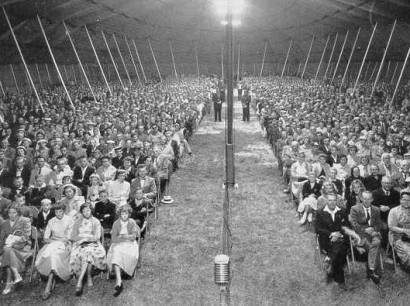This Week's Story
People were bored with "religion" and crime was common when The Second Great Awakening began in New York State.

This Week’s Story relives American history and the Bible through brief inspiring stories presented on mp3 audio recordings and text for reading.
The Wind Blows
“Finney, you must be out of your mind. No preacher should go to Evans Mills or Antwerp. The people there hate preachers and anything to do with religion.”
“So I’ve heard, Judge.”
“Do you know that Antwerp is called Hell’s Acres?”
“Actually I do. That’s why I’m going.”
Judge Wright looked at Finney. He was thirty-two and a wreck, occasionally coughing and spitting blood after six years of intense study, three in law and three in theology. His friends guessed he could not be living much longer.
Within a month, March 22, 1824, Finney arrived on horseback in Evans Mills. People met a man six feet and two inches tall, with plenty of light brown hair, a large and well-proportioned head, and eyes that could be mild or cold. He caught attention!
Soon he was preaching in both wild towns. People liked him and flattered his preaching. They would tell him, “That was a pleasing sermon.” The towns were still rough with men cursing on the streets;
and crime wasn’t decreasing. He decided to make his messages more plain and pointed. Forget any fancy or formal talk.
One evening he said, “You, who have made up your minds to become Christians, and will give your pledge to make your peace with God immediately, should rise up.” Nobody there had heard before such a challenge, and nobody moved to stand.
He shouted, “Then you are committed. You have taken your stand. You have rejected Christ and His Gospel.” The crowd got up immediately and started to leave. He stopped speaking. The people paused. He finished, “I am sorry for you; and will preach for you once more, the Lord willing, tomorrow night.”
The next day the people of Evans Mills talked furiously of tar and feathering Finney. It would publicly humiliate him. They would strip Finney to the waist, put hot tar on his body, and burn him good. Roll him in feathers, or poke feathers into the tar on his body, and parade him down the street.
Finney went that night to the schoolhouse, where he had been preaching. It was already packed with people. He began preaching immediately with no opening music. He ended with no invitation, but announced another meeting.
Afterwards he stayed with a family in the country. All night people kept coming to the home. They wanted forgiveness and peace from God. There was no tar and feathering.
The next night Finney preached. One man brought a gun, intending to kill Finney. The building was jammed with people and Finney gave them a chance to respond. Dozens stood to their feet and pledged to make peace with God. Finney preached several more nights, also visiting people on the streets and in their homes.
Through the summer and fall he went preaching day after day, often twice a day, and usually two hours each time. Miraculously his lungs became healthy and he had no breakdown. For nine years he scarcely paused. After he was married, his wife Lydia, said to him, “I was afraid your labors would destroy you. But you seem to be refreshed in your work. ‘…thy hands are made strong by the hands of the Mighty God….’”
Revival spread throughout New York State, and then throughout Eastern United States. It became part of what historians call The Second Great Awakening, which occurred in many other parts of the United States from about 1790 to 1840. It championed many reforms in society, especially the abolition of slavery.
This is Barbara Steiner reminded that the United States has often had hearts seeking peace with God. Please check out thisweeksstory.com.
<< previous story] [next story >>
We invite your comments! [click here to comment]
This Week's Story is a non-profit supported by listeners. [click here to make a donation]
 click here to play audio
click here to play audio